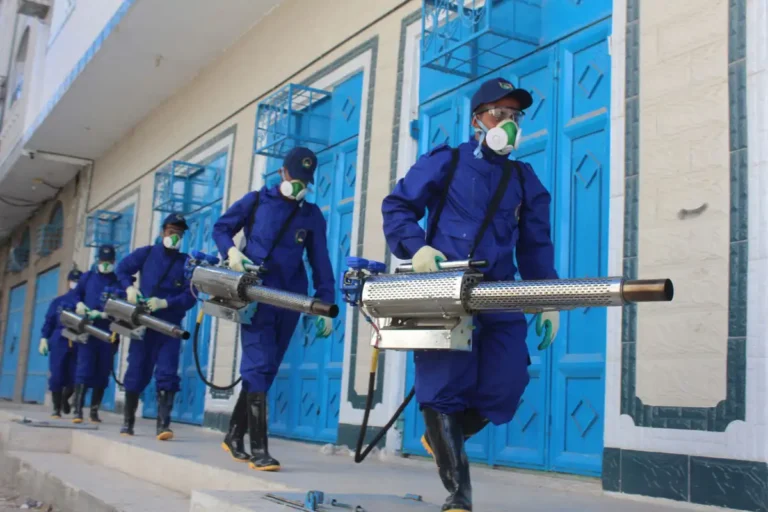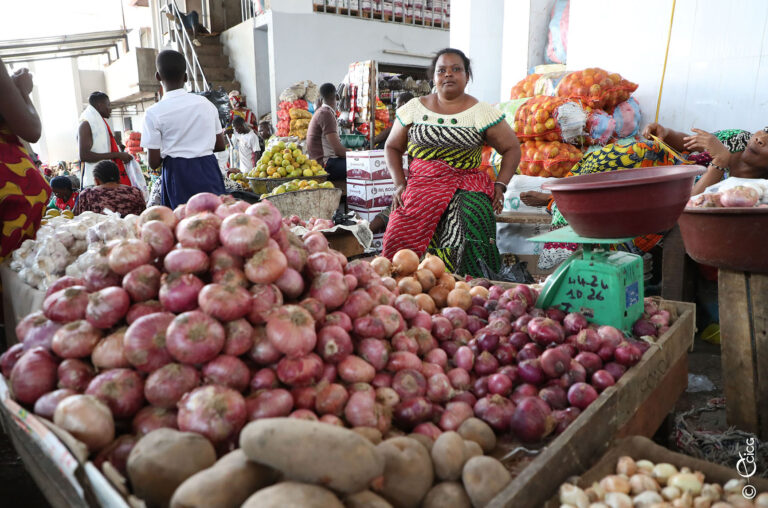“Produce what we consume and consume what we produce”

Introductory statement by the minister of Trade at the 30 March 2022 Press Briefing on the impact of the international situation on the prices of some staples and the measures taken by the Government.
“I would like to thank you very sincerely for taking valuable time out of your schedule to participate in this important press briefing aimed at enlightening our compatriots about the crisis situation that we have been experiencing, that the whole world has been experiencing, for over two years, following the occurrence of the Covid-19 pandemic, which has resulted in an unprecedented deregulation of the global market supply chains and the corresponding resurgence of unprecedented inflationary strains, affecting all the countries of the world, without the slightest exception. And as if that were not enough, the Ukrainian crisis has come on top of this gloomy situation, exposing mankind to a serious risk of a deep food crisis and energy and industrial insecurity.
[arm_restrict_content plan= »3,2, » type= »show »]“Our country, of course, is not immune to this dismal reality, whose impact has nevertheless been mitigated thanks to the stringent measures prescribed by the Head of State, his excellency Paul Biya, and implemented by the Government, for the benefit of the people. I could go on endlessly about the causes, some being objective and others subjective, of this preposterous situation. But, to use a famous phrase, there is the weight of words and there is the shock of pictures, and I mean, in this case, the shock of figures. In this connection, I would like to mention a few revealing figures here:
- for cereals, the price of a tonne of wheat on the international market rose by 27.77% between 2020 and 2021 and that of maize by 56.85%;
- for oilseeds, during the same period, the price of a tonne of palm oil rose by 53.38%, that of soybean oil by 65.37% and that of palm kernel oil by 86.03%;
- in relation to metallurgical and ferrous products, and for the same period, the price per tonne of aluminium rose by 45.12%, iron by 48.46%, copper by 50.91% and tin by 89.10%;
- for other construction materials, specifically the raw materials used in the production of cement, i.e. clinker and gypsum, their prices rose by 60% and 100% respectively;
- finally, for fertilisers and manures used in agricultural production, the price of a tonne of diammonium phosphate (DAP) rose by 92.35%, that of triple super phosphate (TSP) by 103.06% and that of urea by 110.91%.
“Sea freight costs were no exception. The Shanghai Containerized Freight Index, which relates to container transport, rose by 103.44%, while the Baltic Dry Index, which relates to bulk transport, shot up by 172.93%, while the China Containerized Freight Index, which relates to contracts negotiated with shipowners, was up threefold.
A real seismic tremor
“This is the reality of the figures, which is a real seismic tremor, prior to the Ukrainian crisis, which subsequently further made worse a situation that was already gloomy enough. It is well known that Russia and Ukraine are among the world’s largest exporters of grain and oilseeds. The same is true for fertiliser, gas, oil and metals. With regard to cereals, the price of wheat rose again in the last month by 20.7%, maize by 21.2% and barley by 31.2%. As regards oilseeds, Ukraine and Russia account for 80% of world sunflower oil exports. For other oilseeds, such as palm oil, this has resulted in yet another price increase of 40% since the beginning of the year. In the fertiliser sector, the price of urea, potash and phosphate rose by a further 40% since the crisis. In the metals sector, the price of aluminium has risen again, following the crisis, by 68.43%, while the price of a tonne of rolled steel coil rose from USD 600 to USD 1,400 and that of steel plate from USD 650 to USD 2 000. The same applies to iron billets, all of which will seriously affect the construction sector and make consumer prices very expensive. “You have thus had an overview of the current reality of the prices of the main products traded in the world and imported by our country. These different figures, superimposed on each other, embedded in each other, can indeed make you dizzy. In any case, they account for the record inflation rates recorded throughout the world, all countries combined, with peaks of 48.41% in Argentina for example, 19.60% in Turkey, 16.91% in Nigeria, 9.28% in Ghana, 6% on average in the United States and Germany, against 2.3% in Cameroon. No doubt, this is not said loudly and clearly enough: the Government and the economic operators concerned must be credited with having succeeded so far in preventing our market, in such a global context, from experiencing shortages and a generalized price explosion. This is the place for me to pay tribute the important contribution of the economic operators in this battle.
Keeping prices unchanged
“Far be it from me, however, to suggest that we are in a land of milk and honey. Quite the contrary. The situation is difficult and will probably be even more so in the coming weeks and months. This requires us to stick together, to review our ways of doing things, to re-examine our food habits and, in short, to adapt to this new world that is emerging before our often incredulous eyes. Our resilience is due, to a large extent, to the benevolent measures prescribed by the Head of State, his excellency Paul Biya, in support of the purchasing power of consumers, and which are reflected in a very strong drain on the resources intended for the Public Treasury for the development of our country. In the petroleum products and domestic gas sector, for example, and many of us are unaware of this, the Head of State has instructed to keep prices unchanged, despite the soaring price of a barrel.
“When a driver goes to the filling station to buy four-star petrol (super), for example, he/she pays 630 CFA F/litre, whereas the updated price is 1,016 CFA F, the difference, i.e. 386 CFA F, being borne by the State, which will represent, over a twelve-month period, a loss of earnings for the Public Treasury, for super, of 253,000,000,000 CFAF. As for diesel, the price paid at the filling station by users is 575 CFA francs per litre, compared to the actual price of 1,027 CFA francs, or a difference of 452 CFA francs borne by the State, for a total annual cost of 376,000,000,000 CFA francs. For paraffin oil (kerosene), the price paid by users is 350 CFA francs per litre, for an actual price of 849 CFA francs, i.e. a loss of revenue of 43,000,000,000 CFA francs for the State. Overall, the annual subsidy to be paid by the State, under current market conditions, will amount to CFAF 672,000,000,000 for super, diesel oil and paraffin oil. This amount should stand at 70,500,000,000 CFA francs for domestic gas. We, the consumers, continue to pay the price of a 12.5 kg bottle of domestic gas at 6,500 CFA francs, whereas the real price is 13,277 CFA francs, i.e. a difference of 6,777 CFA francs per bottle, borne by the State to relieve the households.
“As for other products, the Head of State has decided on a range of support measures which consist either in the exemption of taxes and customs duties on imports, or in the reduction, at the residual rate, of these duties. The staples concerned include wheat, ferrous products, crude palm oil, rice, fish, other construction materials, etc. In addition, there is a 50% reduction in the advance payment of income tax and the application of a favourable advance payment system calculated on the margin of distributors, or the suspension of the advance payment of income tax, not to mention the suspension of the withholding tax on sales, depending on the sector. All in all, no sector was forgotten as part of these fiscal and customs measures of reduction or exemption of taxes and duties instructed by the Head of State to support consumers, but also companies. “But we must admit that this exercise inevitably leads, at one point or another, to a form of levelling off, in that, once all the taxes have been removed or given up, there will be very little room for manoeuvre left for the State, in the event of the crisis persisting or being prolonged, to continue to support consumer prices with the same efficiency. It is therefore also up to consumers themselves to develop new strategies to cope with to this new crisis environment, which calls for the setting up of what I would call the « solidarity economy ».
A matter for Consumer Associations
“The Government, in addition to the measures I have just mentioned, has paved the way for this, notably in relation with the National Union of Traders of Cameroon, and more specifically with its Centre Branch, represented at this press briefing by Mr Pierre ZAMBO, its Regional Coordinator. The Government has in fact set up a system of bundled purchase of consumer products from either industrial producers or importers, for the benefit of traders who are members of this Union, who can thus buy at preferential prices and resell to consumers under the same conditions. This experiment, and I am speaking in the presence of President Pierre ZAMBO who can testify, is conclusive. It is now a question of extending it to other Regions and to the lower levels, i.e. the Divisions and Sub Divisions.
“It is now also a matter for Consumer Associations of being inspired by this new approach and aligning with it, by organising their members accordingly, on the model of the National Union of Traders of Cameroon, even if the missions are not identical. The Government is ready to support them in this new move with suppliers. It is a matter, at least this is my exhortation, for consumers grouped in neighbourhoods, villages, communities, of doing the same thing, with a view to buying as a group and, inevitably, at a lower price, and then to share the product, at least during the crisis. This could lead to new forms of solidarity in our society. I am thinking in particular of the idea of tontines for food, housing, and so on, with the aim of setting up family or community granaries, where possible. The European Union countries give us a good example of this, proposing, in order to deal with the crisis, to organise themselves to buy their gas in common, among other things. The context requires us to question ourselves, while waiting for us to give meaning to the salutary concept of import-substitution instructed by the Head of State, his excellency Paul Biya. This is indeed the basic solution, i.e. produce what we consume and consume what we produce”.
[armelse] [arm_setup id= »1″ hide_title= »false »] [/arm_restrict_content]






